| Srl | Item |
| 1 |
ID:
133594
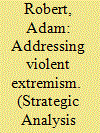

|
|
|
|
|
| Publication |
2014.
|
| Summary/Abstract |
In the years since the hostilities in Sri Lanka ended in 2009, the understandable international focus on the evidence of war crimes by both sides has diverted attention from certain other questions that emerge from the 26-year conflict between the Liberation Tigers of Tamil Eelam (LTTE) and the Sri Lankan government. Here I briefly explore three general questions that have arisen not only in Sri Lanka but also in many other modern conflicts, including those characterised by what is variously called asymmetric warfare, violent extremism or terrorism.
|
|
|
|
|
|
|
|
|
|
|
|
|
|
|
|
| 2 |
ID:
108248
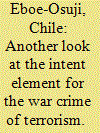

|
|
|
|
|
| Publication |
2011.
|
| Summary/Abstract |
The modern basis of the war crime of terrorism may be found in the terms of article 51(2) of Additional Protocol I (1977) to the Geneva Conventions of 1949, replicated in article 13(2) of Additional Protocol II. The provision forbids attacks carried out for the 'primary purpose of spreading terror' among a civilian population. In view of this provision, the judges of the International Criminal Tribunal for the former Yugoslavia have pronounced terrorism to be a crime of 'specific intent'. In an extension of this reasoning, a Trial Chamber of the Special Court for Sierra Leone has recently held that the crimes of enslavement and militarization of children do not qualify as terrorism, because they were not found to have been committed for the 'primary purpose of spreading terror'. The aim of this paper is to examine the correctness and limits of the proposition that terrorism is a crime of specific intent. In the context of that inquiry, the Rome Statute is examined for what it is able to contribute to the discussion.
|
|
|
|
|
|
|
|
|
|
|
|
|
|
|
|
| 3 |
ID:
076584
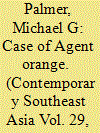

|
|
|
| 4 |
ID:
046974
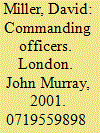

|
|
|
|
|
| Publication |
London, John Murray, 2001.
|
| Description |
xi, 273p.
|
| Standard Number |
0719559898
|
|
|
|
|
|
|
|
|
|
|
|
Copies: C:1/I:0,R:0,Q:0
Circulation
| Accession# | Call# | Current Location | Status | Policy | Location |
| 044581 | 355.33041/MIL 044581 | Main | On Shelf | General | |
|
|
|
|
| 5 |
ID:
128636
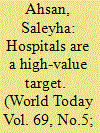

|
|
|
| 6 |
ID:
065580
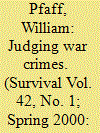

|
|
|
|
|
| Publication |
2000.
|
| Description |
p.59-75
|
|
|
|
|
|
|
|
|
|
|
|
|
|
|
|
| 7 |
ID:
175686
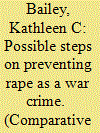

|
|
|
|
|
| Summary/Abstract |
The Japanese military’s history of wanton rape during war continues to dog its diplomacy and economic relations, particularly with South Korea. Although Japan is not alone in its military having committed such war crimes, it does stand out as a developed nation that denies full accountability and seeks to diminish the import of its actions. Japan has an opportunity to make amends and help reduce the likelihood of such heinous crimes in the future worldwide. It should seize the chance to lead rather than obfuscate, to promote healing rather than deny the magnitude of pain that it caused.
|
|
|
|
|
|
|
|
|
|
|
|
|
|
|
|
| 8 |
ID:
103524
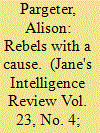

|
|
|
| 9 |
ID:
122002
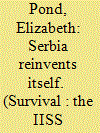

|
|
|
|
|
| Publication |
2013.
|
| Summary/Abstract |
Back in the 1990s, Ivica Dacic, known as 'Little Slobo', was the spokesman who justified strongman Slobodan Milosevic's conquests of neighbouring non-Serbs in the Balkan wars. Aleksandar Vucic, as the information minister of Yugoslav President Milosevic, was the hatchet man for the media who defended the vast ethnic cleansing by paramilitary police of more than 60% of the 90%-majority Albanians living in the Serbian province of Kosovo. Tomislav Nikolic was the deputy leader of the Serbian Radical Party that berated Milosevic for being too soft and not seizing much more contiguous territory for a Greater Serbia; the party's founder, Vojislav Seselj, would shortly report to The Hague for trial on war-crimes charges.
|
|
|
|
|
|
|
|
|
|
|
|
|
|
|
|
| 10 |
ID:
132804
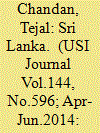

|
|
|
|
|
| Publication |
2014.
|
| Summary/Abstract |
Since the end of the war in Sri Lanka in May 2009, the discourse on Sri Lanka has largely revolved around the country's human rights record and the Government's attempts at redressing Tamil grievances. Revelations in international media about the scale of human rights violations during the last phase of the military operations against the Liberation Tigers of the Tamil Eelam (LTTE) led to mounting international pressure on Sri Lanka for accountability of war crimes. The Sri Lankan Government (SLG), in turn, made efforts to address the issues of resettlement of Internally Displaced Persons (zDPs) and the economic development of war affected zones in the Northern and Eastern Provinces of the country. President Mahinda Rajapakse also constituted the Lessons Learnt and Reconciliation Commission (LLRC) to recommend measures to address the Tamil problem and framed a National Action Plan (NAP) to implement its recommendations. However, key Tamil grievances, related to the devolution of power, remained largely neglected. Attempts at fixing the accountability for human rights violations were also half-hearted. This was evident in the widely publicised Army Court of Inquiry, appointed to investigate allegations of war crimes, which eventually absolved the Army of any wrong- doing'. This in turn, shaped the international opinion on the SLG's willingness to resolve the Tamil problem. Today the prospects for
reconciliation in Sri Lanka are linked to certain key issues. These include (i) Action related to human rights accountability, (ii) Resumption of dialogue between the main Tamil Party, Tamil National Alliance (TNA), and the Government on finding a political solution to the Tamil grievances and, (iii) Preventing the rise of religious intolerance in the country. The contemporary issues with regard to these aspects are discussed in this paper.
|
|
|
|
|
|
|
|
|
|
|
|
|
|
|
|
| 11 |
ID:
133151
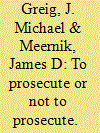

|
|
|
|
|
| Publication |
2014.
|
| Summary/Abstract |
The International Criminal Court (icc) came into force in July 2002 with the potential to drastically alter both the war fighting and peacemaking behavior of states. The icc is designed to try and subsequently punish those found guilty of war crimes, crimes against humanity, and genocide. Supporters of the icc have argued that its establishment will erode the norm of impunity that state and military leaders have historically enjoyed. Yet, another logic suggests that the initiation of an icc investigation or the issuance of an arrest warrant for individuals embroiled in an ongoing dispute may make matters worse. Such individuals may see little reason to stop fighting and reach a settlement if conflict resolution results in their detention in The Hague. Indeed, suspected war criminals and their patrons may wish to escalate their violence in order to avoid showing any sign of weakness or possibility of capitulation lest their enemies press the fight or their rivals seek to undermine their authority. In this article, we explore the potential impact of the icc on the likelihood of peace by examining the impact of actions by the icc - the initiation of investigations into conflict situations and the issuance of arrest warrants for those suspected of committing violations of international law - on the likelihood of mediation. Our findings suggest that while icc arrest warrants can encourage mediation, the initiation of investigations by the icc can actually undermine the occurrence of mediation.
|
|
|
|
|
|
|
|
|
|
|
|
|
|
|
|
| 12 |
ID:
048223
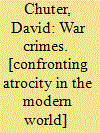

|
|
|
|
|
| Publication |
London, Lynne Rienner Publishers, 2003.
|
| Description |
ix, 298p.
|
| Standard Number |
158826209X
|
|
|
|
|
|
|
|
|
|
|
|
Copies: C:1/I:0,R:0,Q:0
Circulation
| Accession# | Call# | Current Location | Status | Policy | Location |
| 047215 | 341.69/CHU 047215 | Main | On Shelf | General | |
|
|
|
|
| 13 |
ID:
076095
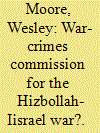

|
|
|